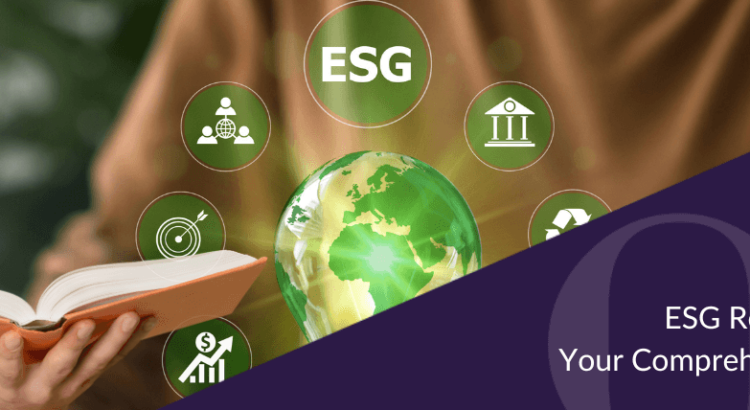ESG reporting stands as a critical pillar for businesses in Hong Kong that aim to align with global standards of sustainability and ethical practices. This guide delves into the essentials of ESG (Environmental, Social, and Governance) by learning what it is and its difference from sustainability, and further covers the crucial role of ESG reporting and the best practices for it, ensuring your business not only meets regulatory expectations but also capitalises on the opportunities presented by sustainable business practices.
What Is ESG?
ESG refers to environmental, social, and governance. These three critical aspects examine the sustainability and societal impact of an investment in a company or enterprise. It is important to know that growing sustainability and green finance laws provide up new opportunities for Hong Kong enterprises. Regulatory organisations, such as the Hong Kong Stock Exchange (HKEX) and Securities and Futures Commission (SFC), are actively trying to promote standardisation in ESG and grow the market for ESG products.
What Is ESG Reporting?
ESG reporting is a company’s open disclosure of its environmental, social, and governance performance and practices in the form of a report. Its goal is to give stakeholders information about the company’s sustainability efforts and ethical operations, emphasising its commitment to risk management and sustainable development. Transparency is highly required to demonstrate a company’s commitment to ethical procedures, as it improves its reputation, and ensures its long-term financial stability. Businesses in Hong Kong and throughout the world may use such reporting along with to demonstrate a proactive approach to tackling relevant ESG risks and opportunities while also meeting regulatory criteria and stakeholder expectations for sustainable business practices.
What Is the Difference Between ESG and Sustainability?
While both sustainability and ESG are regularly interpreted as entailing the same meanings, they differ significantly. Sustainability is a universal term that, in general, can refer to a business’s relationship with the environment; ESG, on the other hand, expands that relationship to encompass social responsibility and measures to combat corruption.
ESG acts as a framework or yardstick for external investments, allowing businesses to share their activities and investors to evaluate the risk and performance of the business. In contrast, sustainability is thought of as an internal structure that directs a business’s capital expenditures. While the organisation’s actions are motivated by sustainability, and their reported results are reflected in ESG.
Given that ESG is primarily a reporting framework, it holds greater relevance for publicly traded companies that seek to attract investors, as well as any business looking to secure financing opportunities. It provides a means for companies to demonstrate their commitment to ESG principles and helps investors make informed decisions.

Why Is ESG Reporting Important for Companies?
ESG reporting is important for companies and businesses alike in Hong Kong for various reasons, which mainly include:

What Are the ESG Reporting Frameworks to Follow in Hong Kong?
ESG reporting frameworks provide guidelines for structuring and disclosing ESG information.
The following are some of the relevant frameworks in Hong Kong:
Hong Kong Stock Exchange (HKEX)
The HKEX has published the “ESG Reporting Guide“, which defines the requirements for listed businesses to file annual ESG reports, including specified obligatory disclosures and extra compliance or explanation disclosures.
The Securities and Futures Commission (SFC)
SFC regularly promotes sustainable finance and enhances ESG reporting in Hong Kong. It has been involved in consultations to help Hong Kong comply with global climate-related reporting standards and enhance the regulatory environment for corporate sustainability disclosures.
Green and Sustainable Finance Cross-Agency Steering Group
This group, co-led by the Hong Kong Monetary Authority (HKMA) and the Securities and Futures Commission (SFC), aims to promote ESG reporting and sustainable finance in Hong Kong by enhancing the regulatory environment and enabling policy direction and cooperation.

What Are the Best Practices for ESG Reporting in Hong Kong?
Upon understanding the framework for ESG reporting, it’s vital to ensure the best practices are put in place for effectiveness.
Here are some of the best practices that can be utilised for ESG reporting in Hong Kong:
Consider enlisting help from an ESG reporting service provider to ensure that you are taking advantage of these best practices to streamline and simplify your ESG efforts for success.
Contact us to get a free 7-day trial on our ESG Access reporting software now.
Is ESG Reporting Mandatory?
Although ESG is currently not mandatory in Hong Kong, the HKEX has proposed mandatory disclosure rules for climate-related risks in ESG reports of listed companies, with a potential effective date of January 1, 2024. The aforementioned ESG Reporting Guide already requires a mandatory statement on the board’s oversight of ESG issues and its management approach. Without specific ESG laws in Hong Kong, there are still regulatory requirements for ESG reporting that include both mandatory and “comply or explain” components that companies in Hong Kong should be aware of.

How Can BoardRoom Help You with ESG Reporting?
BoardRoom supports companies in Hong Kong with comprehensive ESG reporting services, leveraging cutting-edge, blockchain-powered ESG Access platform to simplify data management and enhance operational sustainability. Our tailored approach ensures your compliance with evolving regulations and stakeholder satisfaction, while our extensive experience in APAC jurisdictions offers invaluable insights into local ESG standards. BoardRoom’s full-suite services, from materiality assessments to corporate governance, aim to integrate ESG into every facet of business operations, promoting long-term profitability and sustainability.
Talk to BoardRoom today to find out how we can further help you with our ESG solutions.
Contact BoardRoom for more information:
Related Business Insights
-

22 Mar 2024
Navigating the Importance of ESG Due Diligence in Hong Kong
Discover why ESG due diligence in Hong Kong is on the rise and it can help in decision-making and risk management. …
READ MORE -

11 Mar 2024
Business transformation: revolutionising finance and payroll functions
Understand how business transformation can enhance your finance and payroll functions and how seamless this can be …
READ MORE -

06 Mar 2024
Hong Kong Budget 2024-25 : Attracting Enterprises, Capital and Talent
Explore Hong Kong's 2024-25 Budget, tackling unexpected challenges with a strategic fiscal plan for growth and comp …
READ MORE


